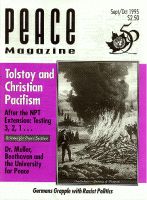
Peace Magazine Sep-Oct 1995, page 23. Some rights reserved.
Search for other articles by Rose Dyson here
Beginning in October, the Canadian Radio and Television Commission (CRTC) will hold a public hearing in Hull, Quebec, regarding violence in television programming. Regional consultations will begin beforehand. These will provide opportunities for Canadians to demand more convincing evidence that the TV industry is implementing its own codes on violence.
Last December, the CRTC accepted a new code adopted by the Canadian pay TV services, on the condition that it include a program classification system now being developed. It is based on the code developed by the Canadian Association of Broadcasters and approved by the CRTC in October, 1993. While calling this a step in the right direction, the Canadians Concerned About Violence in Entertainment (C-CAVE) questions the CRTC's interpretation of media violence. The Commission acknowledges only the harmful effects on children, not to the population at large; it excuses violence in commercials; and it limits gratuitously violent programming only before 9 p.m., when many children and adolescents are watching.
The code approved by the CRTC in 1993 aimed to "protect children from glamorized or gratuitous violence while preserving freedom of expression." Neither code takes into account the research demonstrating the harmful effects of media violence on adolescents and adults. Both codes overlook the fact that children imitate adults and generally find ways to see any film, TV program, or videotape that is on the market-however it may be classified.
So far, there have been few signs of commitment to the self-regulation that was promised. Worse yet, there have been numerous examples of government cooperating with the industry and sparing them the trouble of having to address the issue of media violence at the production stage.
What initiatives has the industry actually taken? In October, the Council of the Canadian Association of Broadcasters ruled that the top-rated children's program, "Mighty Morphin Power Rangers" was too violent for Canadian television. Global Television modified the program somewhat to "meet Canadian standards," whereupon the Council seemed to wash its hands of the problem. C-CAVE objected that the CRTC is too lenient in accommodating the interests of the industry and called upon the Council to complete the job of program assessment it began. C-CAVE regards it as inappropriate for Global Television to be the arbiter of Canadian television broadcasting standards. They have a conflict of interest because of the profitability of airing a program.
The CRTC goes too far in accommodating the interests of the industry. Notice, for example, its decision regarding the upcoming cable channel to be reserved for interactive video games. Ordinarily, private companies wishing to be assigned a channel and receive a broadcasting license must meet CRTC's requirements. However, the CRTC has decided that Sega International's new videogame channels on cable will be exempted from such a review "provided they meet a number of key criteria, including adherence to the private broadcasting industry's violence code." The extraordinary leniency of this decision was too much for Commissioners Spicer, Dawley, and Ross--all of whom reportedly dissented on the ruling.
The government needs to demonstrate that it is acting on behalf of the public interest. The hearings in Hull will give citizens a chance to begin reclaiming our cultural environment.
In another way also, the government has avoided difficult decisions by offering a solution that is no solution. Last year the National Film Board received funding to establish a Media Awareness Centre, on the assumption that education is the key to protecting children and decreasing public tolerance for sexist, racist, and gratuitously violent media content.
This too is a step in the right direction, but a limited one. Many researchers say that education alone cannot possibly address the current crisis. Ours is a market-driven economy. The notion of "freedom of expression" has been distorted to become synonymous with corporate freedom, even for enterprises that sell a toxic product. Education is no match for the powerful media conglomerates.
As the CRTC has noted, "the industry has several groups that lobby and advocate on its behalf on a full-time basis: the public has only the CRTC." It is time to re-constitute the CRTC so that its staff and commissioners include people with specific expertise in behavioral science research concerning the harmful aspects of the mass media.
Rose Dyson is chair of C-CAVE and recently completed a doctoral dissertation on the subject of media violence at OISE.

Peace Magazine Sep-Oct 1995, page 23. Some rights reserved.
Search for other articles by Rose Dyson here